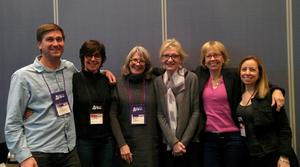
Moderated by Betsy Burton of the King's English Bookshop in Salt Lake City, Utah, the panel explored the life cycle of Strout's bestseller My Name Is Lucy Barton from the perspectives of the author, her agent Molly Friedrich, her Random House editor Susan Kamil, Ruth Liebmann (v-p & director, account marketing, PRH) and bookseller Pete Mulvihill of Green Apple Books in San Francisco, Calif.
"I think that a lot of what an agent does is try to help the author manage expectations, focus on the work, the work; stay honest to the work," Friedrich said, adding that with Strout's manuscripts, "she's been over that work so many times and with such lapidary attention that there's very, very little to say except to be in a kind of swoon of admiration.... And with Lucy Barton in particular, it was kind of perfect."
 |
|
| Pete Mulvihill, Susan Kamil, ABA president Betsy Burton, Elizabeth Strout, Mollly Friedrich and Ruth Liebmann | |
Kamil observed that "editors are like literary shape shifters. We become exactly what our authors need us to become," and recalled that after reading the Lucy Barton manuscript for the first time, "I can't quite describe the feeling to you, though as book lovers I'm sure you know what I mean when I say I was stunned and I was speechless.... I also knew it was a masterwork. It's all about the book. And in this particular case, what a book! I had to get it into the hands of our publishing team."
Because of universally positive response in-house, the goal quickly became making a debut as a #1 bestseller. Liebmann explained the "onions and steak" theory of marketing: "Onions don't like to be put in a very hot pan; you slowly heat them up." She cited Hanya Yanagihara's A Little Life as an example. "We knew we had something amazing and we really loved it, but we didn't push it out big with everyone. We thought the way, in the long run, to build excitement and sell a lot of books was to kind of put the onions in the pan and let you guys be the ambassador for the book and let it build, which it has done fantastically. Thank you."
For a steak, however, a hot cast iron skillet is required "and that is what we are doing with a book like My Name Is Lucy Barton," she continued. "When the book is in your stores, we want you to know about it and we want the consumer to know about it."
Liebmann also stressed the importance of sales reps in the life cycle of a book: "The reps represent us to you, but the other thing they do that is just as important, and sometimes more important, is they represent you and your stores back to us.... We are talking about you all the time, especially for literary fiction.... We're probably spending more time talking about the independents than you might guess because you're very important to us at this part of the process."
In addition to his buyers at Green Apple Books, Mulvihill said, "There are 35 employees, and all of them contribute to the buying process.... Our reps are always putting piles of books in our hands. Other booksellers are saying 'You've got to read this.' Sometimes you get a really nice handwritten note from an editor you've never met, and there's your first name. How can you not give it at least 20 pages, right?... After we decide what to buy, we have to decide where to place it, how many copies to get. It's easy with an author like Liz because she has a track record."
Strout noted the strange feeling she has "when I have given up the book.... There's a sense of anxiety because I realize it's now gone from me. You just hope that it will be okay. So there's an anxiety that builds up before a pub date, and then I'm on tour, so that helps because I meet my readers and that's always really nice, and helps me connect once again to the piece of work, which I have given up."
And what happens at the end of the cycle, on pub day? Kamil said, "The scariest thing that happens is we start thinking about the paperback. And we have to do it all over again." --Robert Gray

